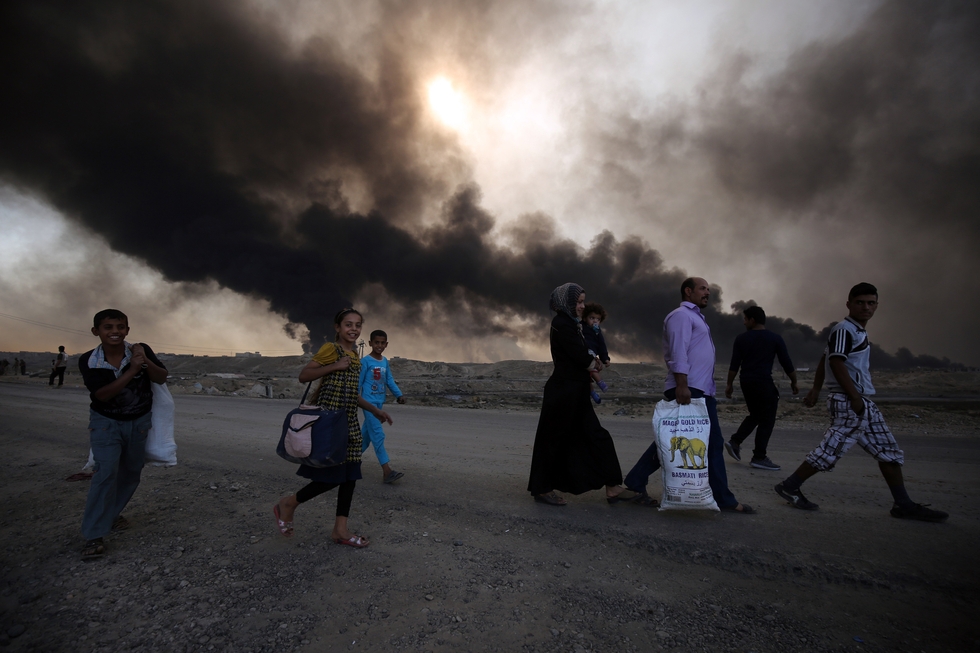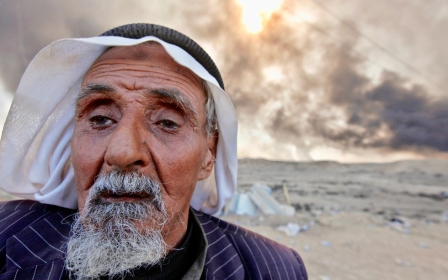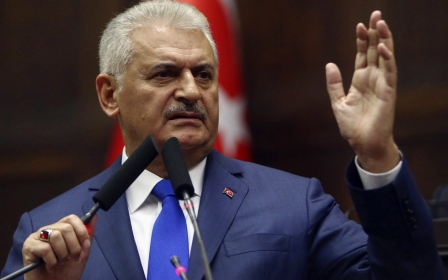IS set fire to sulphur fields, creating toxic gas clouds that injure 1,000

ERBIL, Iraq – The Islamic State group has injured over 1,000 people by creating toxic clouds caused by burning sulphur fields, as the militant group desperately attempts to cling to control of Mosul in the face of a military onslaught from the Iraqi army and Kurdish forces.
Late last week IS began to burn oil and sulphur at wells in Qayyarah - an Iraqi town some 30km south of Mosul - as the pressure intensifies on the militant group.
The sulphur gas released by the fires has endangered the lives of thousands of civilians, leading military commanders to raise fears about the group increasing its chemical attacks.
“As the assault on Mosul begins its final and decisive stages there is increased concerns about ISIS chemical gas usage,” Hamish de Bretton-Gordon told MEE.
De Bretton-Gordon is the former commanding officer of the UK Chemical, Biological, Radiological and Nuclear (CBRN) Regiment and Nato's Rapid Reaction CBRN Battalion, who now advises Kurdish Peshmerga forces and NGOs on chemical attacks.
“IS carried out at least 20 chemical attacks in the last months with mustard gas and chlorine,” he said, adding that this is the first time that IS is burning sulphur fields.
“It is generally accepted that IS will use all weapons to defend Mosul including their extensive chemical weapons stockpile. The Peshmerga [Kurdish forces] in particular believe that IS intends to blow up the Mishraq chemical complex 30km south of Mosul in face of the Iraqi army and Peshmerga advances. This facility and sulphur mine contains hundreds of thousands of tonnes of toxic chemical,” he said.
On Thursday IS started to burn sulphur fields at the Mishraq chemical complex, creating toxic hydrogen clouds hurting over 1,000 civilians and security forces who are now receiving medical treatment.
“Mishraq is already on fire, US troops are in gas masks and over 1,000 casualties are reported,” de Bretton-Gordon said.
Hundreds of people have been admitted to the nearby Qayyara central hospital with respiratory problems since Friday, hospital director Abdul Salam Jabbouri told Reuters on Saturday.
"We have had every type of person come in with breathing problems and burning eyes - children, adults, policemen, soldiers," Jabbouri said. "Daesh [IS] set the sulphur on fire so nobody can come near them."
De Bretton-Gordon warned that if IS continues to set toxic chemicals on fire it could lead to a large number of deaths.
“A major explosion could release large amounts of highly toxic hydrogen sulphide [H2S] and Sulhpur Dioxide [SO2] into the atmosphere. A fire at the complex in 2003 made a hole in the ozone layer and created hundreds of casualties. This could produce a considerable downwind hazard, perhaps 10-20km long, and any troops, NGOs and media who may be in the area need appropriate protection,” he added.
The US-led coalition has provided the security forces with 24,000 gas masks in the past to deal with IS chemical attacks that were carried out against Kurdish and Iraqi security forces.
“The masks were provided during training in preparation for the operation to liberate Mosul. The masks were provided quite some time ago,” British Army Major Christopher Parker told MEE.
“The current situation demonstrates the relevance of the need for masks,” he added.
The US-led coalition is assessing the potential risk at their military base known as Camp Swift in north Iraq as a result of the burning oil wells and the sulphur plant fire.
“The Coalition has taken air samples and analysis is on-going to determine what, if any, concerns may result from this incident,” the coalition said in a statement.
“As a precaution, Coalition personnel at sites affected by the smoke have been directed to limit their activity outdoors. Some service members have voluntarily chosen to don protective masks for their own comfort,” the coalition said.
“The enemy has used chemical weapons in the past, and we're going to make sure we are taking every measure to mitigate the risk to our forces," Major General Gary J Volesky, commander of the Combined Joint Forces Land Component Command, said in a statement emailed to MEE. "Force protection is my number one priority here.”
"The Coalition is trained. We've trained the ISF [Iraqi Security Forces] and Peshmerga; they've got equipment," said Volesky. "We're confident that as the enemy attempt to use a lot of means - not just chemicals - we're targeting the training with the Iraqis and with the Coalition to make sure we're mitigating any risk of that threat," he added.
The Iraqi government is working to put out the fires, which could take approximately two to three days to complete, coalition sources said.
However, de Bretton-Gordon warned that it could take longer. “This is already a massive problem. It’s all over Twitter at the moment. The authorities say they will put out in two days but this could be very difficult and it burned for two months in 2003,” he said.
Peshmerga spokesperson Halgurd Hikmet confirmed to MEE that IS has started burning sulphur fields.
“Some Peshmergas became unwell, they burned sulphur fields, but luckily the wind direction changed to the south, so today the situation is better,” he said.
He confirmed that Peshmerga forces received gas masks, but it was unclear how many the Kurds received. “In the past, IS burned other [oil] fields, but this is the first time they burn [chemical] fields,” he said.
This is not the first time IS has tried to use chemical weapons against their enemies.
Hassam Humaydi, a water engineer who lived in IS’ Syrian capital Raqqa told MEE in May that IS had tried to use chlorine to make chemical weapons.
“One year ago I was working in medical relief in Syria, and they [IS] sent us quantity [of] chlorine [for] cleaning water. They took it and they wanted to use it in rockets as a chemical weapon - we wanted to use it for cleaning water,” he said.
“IS now controls the water treatment plant, and the water in Raqqa is undrinkable. This is caused by Daesh [IS]," he said. “There is no filtration, and people are drinking it. Now in Tal Abyad we are working to improve the water,” he said.
Humaydi now works with the local administration in Tal Abyad, which is controlled by the US-backed Kurdish-led Syrian Democratic Forces.
Michael Stephens, research fellow at the Royal United Services Institute, told MEE the latest events show how IS disregards the life of civilians.
“It’s basically a low-grade form of chemical warfare. But very foolish because it leaves you at the mercy of the wind and can backfire badly. It shows how callous the IS disregard is for the life and safety of civilians,” he said.
Middle East Eye propose une couverture et une analyse indépendantes et incomparables du Moyen-Orient, de l’Afrique du Nord et d’autres régions du monde. Pour en savoir plus sur la reprise de ce contenu et les frais qui s’appliquent, veuillez remplir ce formulaire [en anglais]. Pour en savoir plus sur MEE, cliquez ici [en anglais].




